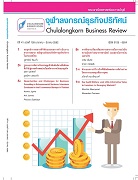The Trust Model of Engagement in Fundraising Campaign
Main Article Content
Abstract
Nonprofit organizations play a crucial role in the nation development; they are established to deliver social missions. In order to accomplish those missions, they have to acquire fund from government, private, and public sources. Monetary donation from general publics is one of those sources of fund. The current study employs a marketing concept, engagement, to study in a nonprofit context. Engagement has a significant role in relationship marketing, such as in customer-brand relationship, customer-firm relationship, and customer brand community. The objective of this study is to identify factors that have an effect on engagement. The studied factors are trust and the antecedents of trust, namely communication, reputation, and transparency. Data was collected from donors who made monetary giving to “Kaokonlakao” Project 2, a running charity project initated and led by Khun Artiwara Khongmalai or Toon Bodyslam. The study employs PLS-SEM to analyse data. Results of the analysis confirms all hypotheses and explain 73.4% and 28.0% of trust and engagement variance respectively. The research has both managerial and theoretical contributions. In an attempt to increase potential donors’ engagement with charitable activities, management of nonprofit organizations should design activities that induce participation from potential donors. Nonprofit organizations should regularly communicate informations related to their performance, financial status, usage of fund, etc. The shared information, in turn, leads to organizations’ reputation and trust. This study is one of the rare extant researches that adopt marketing concept to study in the Thai nonprofit context. In addition, it responds to Marketing Science Institute’s research priorities to investigate the “Engagement” concept.
Article Details
Opinions and discussions in papers published by the Creative Business and Sustainability Journal (CBSJ) are deemed as personal opinions and the responsibility of the writers. They are not the opinions or responsibility of the Chulalongkorn Business School of Chulalongkorn University.
Papers, content, information etc. appearing in the Journal are deemed to be the copyright property of the Chulalongkorn Business School of Chulalongkorn University. Anybody or any organization that wishes to publish any part of them or use them in any way must obtain written permission from the Chulalongkorn Business School, Chulalongkorn University.


